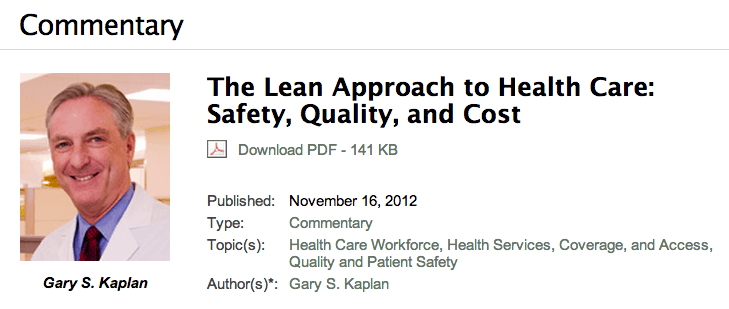Here is a commentary that was written by Gary S. Kaplan, MD, the CEO of Virginia Mason Medical Center:
“The Lean Approach to Health Care: Safety, Quality, and Cost.”
More than a decade ago, Kaplan and the team at VMMC realized they had to focus “on three things: 1) the safety of patients while in our care; 2) the quality of the care we provided; and 3) the cost of delivering care.”
Their approach for this?
We found the necessary tools in the Toyota Production System (TPS). TPS is often referred to as a “Lean” management method, because it focuses on reducing waste while improving quality. We call our version the Virginia Mason Production System, or VMPS.
It's not just about “tools” – it's about the culture and a system for daily management and improvement at VMMC.
Learning to use VMPS consistently and effectively is part of changing the culture and takes many years. This is really not unexpected. A Lean system like VMPS re-quires deep organizational changes — changes that challenge long-held beliefs and accepted practices. Our results have been gratifying and propel us to work even harder to deploy these methods and tools deeply within our organization.
Kaplan outlines some examples of their improvements in areas ranging from nursing to the improved management of chronic diseases.
In nursing:
Steps walked per day fell from 10,000 to roughly 1,200. The VMPS workshops also evaluated nurses' duties and reassigned work, such as room setup, to other staff, thereby increasing the nurse-patient time from 35 percent to more than 90 percent.
This, of course, leads to better patient care.
Kaplan concludes his piece by emphasizing that their improvements are repeatable at any healthcare organization. Waste certainly abounds.. and it's fixable… having a CEO leading the charge certainly increases your chances for success…
Please scroll down (or click) to post a comment. Connect with me on LinkedIn.
Let’s work together to build a culture of continuous improvement and psychological safety. If you're a leader looking to create lasting change—not just projects—I help organizations:
- Engage people at all levels in sustainable improvement
- Shift from fear of mistakes to learning from them
- Apply Lean thinking in practical, people-centered ways
Interested in coaching or a keynote talk? Let’s start a conversation.











The CEO leading the charge increases the chances for success? How about “the CEO leading the charge is required to have a chance for success”? Can someone point out to me a successful Lean organization in healthcare or otherwise that has a delegate leading Lean? I think what we may see in the delegate organizations are a lot of tools being applied but no systematic or cultural change and in fact, not a lot of measureable system improvement.
We’ve all heard about the 95% of organizations undertaking Lean fail. Why don’t we hear about Lean failures in healthcare? Is it too early? Are we counting a reorganized equipment room as success?
Yeah I probably understated that. CEO leadership greatly increases the success rate (of success is defined as culture change along with safety, quality, access, cost, and morale improvements – not just a supply room or two).
I hear of Lean failures… of the “We tried lean and it didn’t work” variety. But I’ve always said Lean doesn’t succeed or fail, people do.
As to 95% – there was some study that cited that number about how Lean “didn’t meet expectations.” That could be the fault of unrealistic expectations of Lean being an easy silver bullet. Like Dr. Kaplan says, it is not.
Different subject, but considering there is much to be learned from failure, I would be very interested in learning from other organization’s Lean failures. I think ThedaCare has been very open about their early/ongoing challenges but not sure there is much else out there.
I should write a blog post about what I’ve heard anecdotally.
One major failure mode seems to be thinking Lean can be delegated — hiring just one person or relying on a department to “make us Lean.”
Blog post on the single hire problem.
Also, relying just on a single tool, like 5S, can be a big problem.